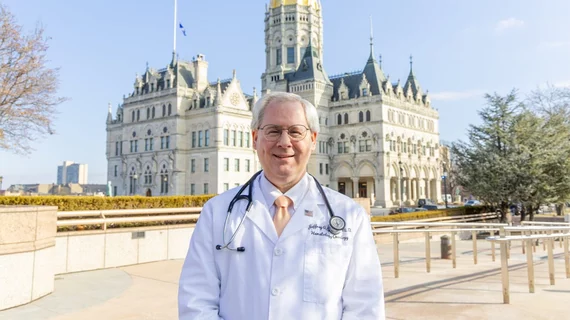State lawmaker wants increased scrutiny around Rad Partners affiliate Jefferson Radiology
A state lawmaker in Connecticut wants to increase scrutiny around Jefferson Radiology following numerous accounts of long wait times at the Rad Partners affiliate.
Reports first surfaced in December, with patients reportedly waiting weeks to receive routine exams results from the Hartford-based practice. Republican Sen. Jeffrey Gordon, MD, said Wednesday that he has heard from a dozen constituents about the issue and also discussed it with his physician colleagues.
A practicing hematologist, Gordon sent a letter to the Connecticut Department of Public Health Jan. 19, demanding answers on how state regulators are addressing the issue. DPH could not provide comment by Radiology Business’ deadline late Wednesday.
“As a physician who has more than 30 years of direct patient care experience, and as a state senator, I am concerned about the delays in the readings of radiology tests that have occurred by Jefferson Radiology,” Gordon wrote Sunday. “I have heard from constituents of mine and from others who are patients who have waited lengthy periods of time for their tests to be read and reported, or who are still waiting. I know that there are physician and healthcare professional colleagues of mine who have expressed concerns,” he added.
Gordon posed a series of questions to the agency, including: What actions is it taking to determine the scope of what is occurring? Does it understand the reasons behind these delays? And how might the DPH respond to ensure these issues are resolved? In an interview Wednesday, Gordon said he is mulling possible policy remedies, but he first wants to learn more. Founded in 1963, Jefferson Radiology is a highly respected local practice, he emphasized.
“They have very good doctors, so I'm not blaming the quality of their care or individual people,” he told Radiology Business by phone. “This seems to be a system-process problem and I'm not fully certain why this is happening. Is it their business model, what's happening with them, staffing, a lack of radiologists? This is what I'm pushing the state to investigate because you can't have this type of thing happening, especially since Jefferson Radiology also has contracts to read images for local hospitals. We need to make certain patients are getting these studies done in in a timely manner.”
Gordon and others such as Democratic state Sen. M. Saud Anwar, MD, a pulmonologist, are mulling legislation to potentially increase guardrails around private equity ownership of physician practices and hospitals. Mednax acquired Jefferson Radiology in September 2017 before selling its imaging business line to Rad Partners for $885 million in December 2020. Nashville, Tennessee-based PE firm Whistler Capital owns a minority stake in RP, and Connecticut lawmakers have raised concerns about investor-owned healthcare after Prospect Medical Holdings recently filed for bankruptcy. Prospect operates 16 hospitals across Connecticut, California, Pennsylvania and Rhode Island, and lawmakers are concerned about the health of these vital community institutions.
Sen. Anwar speculates that the issues at Jefferson Radiology are due, in part, to Rad Partners and its investors.
“The ones to be blamed are these companies that used their profit, their greed, to harm the industry at the cost of the patients,” he told WFSB Hartford. “As soon as the private equity has been involved, it has resulted in after—I use the term ‘honeymoon period’ of everything looking good—then they start to cut corners. They start to move the investment models. They start to reduce the salaries and that results in the workforce just leaving.”
Rad Partners refuted these accusations in a statement shared Wednesday.
“Radiology Partners and Jefferson Radiology remain committed to retaining top talent and have invested in recruiting and retaining skilled radiologists to meet patient needs despite the challenges facing the entire radiology specialty, such as the increased demand for imaging and the national shortage of radiologists,” a spokesperson told Radiology Business Jan. 22. “Contrary to recent public statements, Radiology Partners and Jefferson Radiology have not implemented salary reductions for radiologists; in fact, radiologist salaries at Jefferson have increased in addition to significant investments in IT infrastructure. Like all radiology practices and departments, we must offer competitive compensation to maintain staffing, serve our partners and most importantly our patients.”
RP said it is undertaking initiatives to address complaints about wait times at Jefferson. Response measures have included hiring additional local radiologists, increasing capacity by tapping into its national network of over 3,500 physicians, and conducting operational reviews to identify ways to reduce wait times. RP has already “significantly increased the volume of completed studies and expects to resume normal wait times soon.” As part of the process, the practice is strengthening communications with patients to keep them informed about their exam status, timelines and alternative care options.
“The team at Jefferson Radiology remains committed to providing timely outcomes, continued support and high-quality care to patients. We understand that delays can cause stress and uncertainty. We regret any inconvenience or concerns patients have experienced,” the spokesperson said. “We welcome the opportunity to collaborate with stakeholders, including the Department of Public Health and legislative leaders, to identify solutions that ensure timely care for all patients,” they added later.
Gordon said he is not seeking to be “heavy-handed” in proposing possible legislative remedies to the situation. The senator also recently proposed a workforce development bill to address healthcare staffing shortages in Connecticut. Along with rising demand, Jefferson Radiology is grappling with the need to fill several open positions.
“We need to see what we can do to attract more healthcare professionals in Connecticut and convince them to stay here,” Gordon said. “But at the same time, the state's not here to hire people and send them to Jefferson Radiology. We’ve got to see what's really limiting them, what the problem is, and why other places are able to hire radiologists or retain them in Connecticut. What's going on with Jefferson Radiology? I don't know those details. We need to find those out.”

